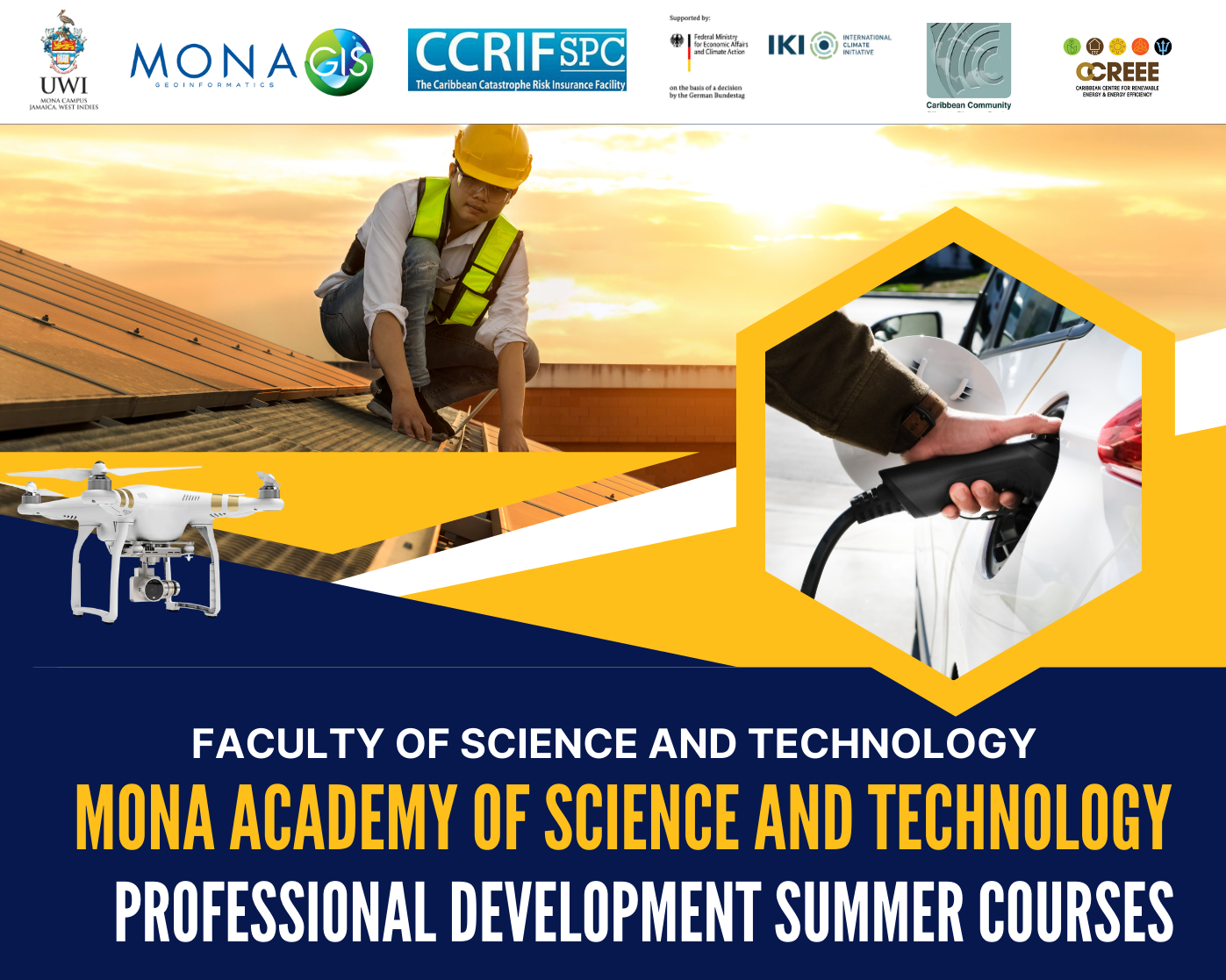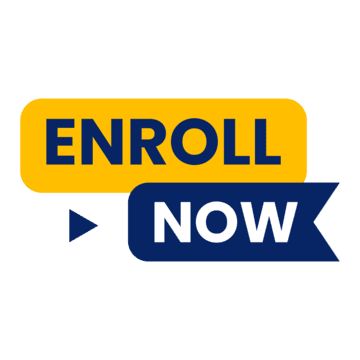

Welcome to the Mona Academy of Science and Technology (MAST), your gateway to professional development! At MAST, we are dedicated to advancing learning for the positive transformation of the Caribbean and the wider world.
Conceptualized by the Faculty of Science and Technology at The University of the West Indies, Mona, MAST has partnered with four esteemed institutions to bring you over 10 dynamic courses from June to August 2024 and another four between September and December 2024. Our partners include: Mona GeoInformatics Institute (MGI), Caribbean Community Climate Change Centre, German Agency for International Cooperation (GiZ), Caribbean Centre for Renewable Energy and Energy Efficiency (CCREEE) and The Caribbean Catastrophe Risk Insurance Facility (CCRIF SPC).
Our courses are taught by leading experts in their fields, ensuring you receive the highest quality education and practical insights. Join us and take the next step in your professional journey with courses designed to inspire, educate, and empower. Whether you’re looking to enhance your skills or gain new expertise, MAST is here to support your growth and success. Explore our offerings today and transform your future! See MAST offerings below:
2025 - Summary of MAST Offerings | Click here to register
2024 - Summary of MAST Offerings


Overview: Want to level up your tech skills and join the drone revolution? The Drone Technologies course is the perfect place to start! Choose from any one or all six modules. You’ll learn the ins and outs of drone operation, from UAV Technology, 2D/3D Mapping to doing practical flights. Plus, you’ll get hands-on training from our expert instructors. Whether you’re a beginner or a seasoned pro, this course is designed to help you stay ahead of the curve. So what are you waiting for? Sign up now and take your skills to new heights!
Overview: The Caribbean Regional X-ray Science Toward Advancement Laboratory (crXstal) was established in October 2024 in the Department of Chemistry, Faculty of Science and Technology at The University of the West Indies, Mona, Jamaica, as a regional hub dedicated to capacity building in X-ray crystallography through education and research. Its primary objectives are: 1) to teach X-ray crystallography through short courses, training schools and outreach activities aimed at popularizing the technique especially among youth; 2) to facilitate cutting-edge research that address regional challenges and position the Caribbean as a global leader in innovation and 3) crXstal is presently equipped with a Bruker D8 Quest Eco single-crystal diffractometer and an Oxford Diffraction cryostat.
Topics to be covered: Symmetry in crystals. Lattices, unit cells, point groups and space groups. Diffraction of X-rays by crystals. Bragg’s Law. The reciprocal lattice and the Ewald Sphere. Systematic absences, structure factors and electron densities. Use of the International Tables for Crystallography Vol. A. Crystal growth techniques. Crystal selection and mounting. Data collection and reduction. Structure solution and refinement. Structural analysis and reporting – molecular graphics and the CIF file. Use of various software packages for structure solution, refinement and display. Structure validation and publication. The Cambridge Structural Database. Introduction to crystallography using synchrotron radiation. Examples of applications of single crystal X-ray diffraction. The programme will include hands-on sessions on the Bruker D8 ECO Quest so students will have the opportunity to collect their own data and solve the structures.
Target Audience: Postgraduate students and researchers/ faculty members from any university, and Industry persons in a STEM discipline.
Pre-course Requirement: A voluntary, online two-day pre-course will be held one week before the start of the school with the aim of levelling the background. It will cover basic principles of symmetry and linear algebra with exercises.
Date: June 2-7, 2025
Modality: Face-to-Face
Cost: USD 700 (excludes accommodation, airfare, and local travel to and from airport)
Venue: Kingston, Jamaica
APPLY AT: INAUGURAL CARIBBEAN CRYSTALLOGRAPHY SCHOOL
Lecturers
Tutors/Lab Assistants:
International Scientific Committee
Organizing Committee
Facilitators and Partners
Endorsements
Qualification: Participants will be awarded 'Certificate of Participation' upon successful completion.
The Organizing Committee of the Caribbean Crystallography School 2025 shall observe the basic policy of non-discrimination and affirms the right and freedom of scientists to associate in international scientific activity without regard to such factors as ethnic origin, religion, citizenship, language, political stance, gender, sex or age, in accordance with the Statutes of the International Council for Science. At this School no barriers will exist which would prevent the participation of bona fide scientists.
Overview: Jamaica is subject to extreme climate-related hazards (hurricanes, storm surges, floods, droughts, landslides etc.) as well as to the risk of a major earthquake. In recent decades, the island has experienced the impacts – directly and indirectly – of more intense storms and hurricanes, including Categories 4 and 5 strengths, while the occurrence of floods and droughts has increased since the 2000s. These climate impacts represent a threat to Jamaica’s economic development and sustainability. This initiative focuses on the resilience of energy (including generation, transmission and distribution), transport (including roads, rail, ports and airports) and water (including supply, storage and distribution networks)
A climate risk analysis and decision support platform, the Jamaica Systemic Risk Analysis Tool (J-SRAT) was developed by the University of Oxford in partnership with the Planning Institute of Jamaica. The partnership now includes The University of the West Indies to collaboratively update the tool. The aim of J-SRAT is to provide evidence for decision making by the Government of Jamaica (GoJ) to build resilience within the nation’s infrastructure systems in the face of intensifying climate risks.
Venue: Centre for Advanced Research in Renewable Energy (NET ZERO BUILDING), The University of the West Indies, Mona
Facilitator: Department of Physics, Faculty of Science and Technology, The University of the West Indies, Mona
Qualification: Participants will be awarded Certificate of Participation upon completion.
APPLY AT: MAST - Introduction to Jamaica Systemic Risk Assessment Tool
Overview: The course will provide a comprehensive introduction to occupational safety and health (OSH) for workers across various industries. Modeled after the USA's 10-hour OSH course for general industry, The UWI course focuses on raising awareness of workplace hazards and teaching participants how to identify, prevent, and mitigate risks.
Participants will learn about current and proposed legislative frameworks in Jamaica, along with best practices recommended by the International Labour Organisation (ILO) and other global standards.
Facilitator: Dr. D. Gary Brown, CIH, RS, DAAS, Graduate Programme Coordinator and Foundation Professor at Eastern Kentucky University's Environmental Health Science and Sustainability Department and Adjunct Senior Lecturer in The University of the West Indies.
Registration deadline: October 18, 2024
Venue: Centre for Advanced Research in Renewable Energy (NET ZERO BUILDING), The University of the West Indies, Mona
Facilitator: Department of Chemistry, Faculty of Science and Technology, The University of the West Indies, Mona
Qualification: Participants will be awarded Certificate of Participation upon completion.
APPLY AT: MAST - Introduction to Occupational Safety and Health (OSH) for General Industry
Overview: Want to level up your tech skills and join the drone revolution? The Drone Technologies course is the perfect place to start! Choose from any one or all five modules. You’ll learn the ins and outs of drone operation, from UAV Technology, 2D/3D Mapping to doing practical flights. Plus, you’ll get hands-on training from our expert instructors. Whether you’re a beginner or a seasoned pro, this course is designed to help you stay ahead of the curve. So what are you waiting for? Sign up now and take your skills to new heights!
Overview: Linking regional impacts such as loss and damage to climate change, can present significant challenges. Our ability to establish this link statistically represents an emerging field called "detection and attribution". Detection is the process of demonstrating that climate has changed in some defined statistical sense. Attribution is the process of establishing the most likely causes for a detected change with some level of confidence. The objectives of this workshop are to inform Caribbean scientists and practitioners, on the 'what' and 'why' of detection and attribution science; and to introduce some of the methodologies and tools for conducting detection and attribution studies in the region. Click here for programme.
Overview: We at the Biotechnology Centre, CCRIB, Faculty of Science and Technology at your very own University of the West Indies have designed a summer certificate course with you in mind. Have you ever wanted green fingers but so unsure that you haven’t tried to grow a plant as yet? Did you know plants can be clean from bacteria, fungi, nematodes and even viruses? Did you know there was a way to grow large numbers of plants that are identical copies, all free from diseases but not genetically modified? The very same plant you put into tissue culture in the lab, say Negro yam, is the very same plant you get out? Did you know there are over 20 varieties of yams growing in Jamaica? Did you know yam seeds weigh less than 0.02 g? Do you know how to make essential oils, biopesticides, herbal candles, soaps, creams and lotions from our plants? If you ever asked any of these questions, either as an individual, or as a company looking to collaborate for sustainable agriculture.
Overview: Training scientists in the Caribbean to perform climate modelling can greatly benefit the region's efforts to address the unique challenges posed by climate change. The Caribbean faces vulnerabilities such as increased frequency and intensity of hurricanes, rising sea levels, coral bleaching, and threats to its tourism and agriculture sectors. By training local scientists in climate modelling, they can develop a deeper understanding of the specific climate dynamics and impacts in the Caribbean, enabling more effective climate adaptation and mitigation strategies tailored to the region's needs. Climate modelling provides a powerful tool for assessing the potential impacts of climate change and evaluating policy options. This workshop will build capacity in the region for climate modelling and provision of associated climate monitoring and response services through the creation of a cadre of aspiring modellers.
Overview: This course is designed to provide teachers with a working understanding of the technologies, trends and sustainability considerations of electric mobility. The course explores technological advancements, environmental implications and societal impacts of electric mobility. Course participants are exposed to strategies that have been employed in the implementation of EV solutions in different countries, challenges that have been encountered, and solutions that are being developed. The course will demonstrate how basic principles of science and technology are utilized to design and build efficient electric mobility systems.
Overview: This course is designed to provide teachers with a working understanding of the technologies, trends and sustainability considerations of electric mobility. The course explores technological advancements, environmental implications and societal impacts of electric mobility. Course participants are exposed to strategies that have been employed in the implementation of EV solutions in different countries, challenges that have been encountered, and solutions that are being developed. The course will demonstrate how basic principles of science and technology are utilized to design and build efficient electric mobility systems.
Overview: Healthy coastal ecosystems offer protection against the ravages of natural disasters and climate induced changes like excessive land runoff and increased storminess. Coastal systems have come under increasing threat from human activities and natural disasters. The rate of loss of these systems and associated habitats has accelerated in recent decades due to chronic levels of impacts and climate variability. This loss must be mitigated in light of the tremendous ecosystem services provided by these ecosystems and the need for resilience in the face of a changing climate. It is therefore necessary to assist the natural systems to recover from human/climate induced degradation so that the ecosystem services and associated benefits can be perpetuated or even improved. This course will expose students to the causes of coastal habitat degradation and loss, the loss in associated ecosystem services and therefore the need for effective options and approaches to generate real habitat rehabilitation or restoration. It will assist students to conduct field and desk-top assessments to diagnose these impacts and design effective interventions. Environmental professionals and practitioners who seek to design effective rehabilitation plans for coastal habitats to mitigate loss will learn what works through actual hands-on rehabilitation exercises. Furthermore, there has been ongoing research and continued development of alternative restoration techniques, applicable to small island developing states like Jamaica.
Course Overview: The course will cover topics regarding the process of food development.Food development is a multifaceted process requiring collaborative effort across various disciplines. Marketing professionals are pivotal in conceptualizing the product, drawing upon their expertise to define its unique selling proposition and target market. Food science and technology experts translate these concepts into tangible creations ensuring that the final product aligns with consumer expectations regarding taste, texture, and overall sensory experience. Further on an assessment of the product's cost-effectiveness and market viability, considering factors such as ingredient sourcing, manufacturing processes, and competitive landscape. Moreover, sensory evaluation is a crucial component in validating the product concept. Finally, as the product nears completion, attention shifts toward packaging, labelling, and market launch strategies.
PART 1 (ONLINE)
Webinars: 10 theoretical sessions that will last 60 – 90 minutes each.
Time: Wednesdays at 12:00 p.m. (Mexican Time) / 1:00p.m. JA Time
|
Dates |
Topics |
|
July 17 & 31, 2024 |
|
|
August 14 & 28 , 2024 |
|
|
September 11 & 25, 2024 |
|
|
October 9 & 23, 2024 |
|
|
November 6 & 20, 2024 |
|
PART 2 (FACE TO FACE): This part of the course will take place during the first week of December 2024.
Course Overview: The Caribbean imports more than 60% of the fuel required for residential, commercial and residential activities thereby making the region vulnerable to high energy costs, price volatility and supply disruptions. This is compounded by a proliferation of inefficient infrastructure resulting in a high energy intensity compared to global averages. A systematic approach to optimising the use of energy is, therefore, crucial to address the region's unique energy-related challenges while leveraging opportunities for sustainable development, economic growth, and enhanced resilience. Effective energy management can significantly reduce energy consumption and operational costs, thereby improving the economic viability of businesses and households. The Caribbean is also highly vulnerable to the impacts of climate change, including sea-level rise, hurricanes, and extreme weather events. Energy management contributes to environmental sustainability by reducing greenhouse gas emissions and mitigating climate change, which is critical for preserving the region’s natural beauty and biodiversity.
The "Energy Management for the Caribbean" course provides a comprehensive introduction to energy management principles, emphasizing the practical application of ISO 50001 standards and the CARICOM Regional Energy Efficiency Building Code (CREEBC). This course is designed to equip professionals, policymakers, and energy managers with the knowledge and skills necessary to implement effective energy management systems whereby they utilise energy more effectively while maintaining the levels of activity and productivity.
Participants will explore the fundamentals of energy management, including energy auditing, monitoring, and performance assessment. The course delves into ISO 50001, an internationally recognized standard for energy management systems, offering a structured framework to improve energy performance, reduce costs, and enhance environmental sustainability. Attendees will learn how to establish, implement, maintain, and improve an energy management system that aligns with organizational goals and complies with ISO 50001 requirements.
Additionally, the course highlights the CARICOM Regional Energy Efficiency Building Code, providing insights into region-specific regulations and best practices for energy-efficient building design, construction, and operation. Through case studies and practical examples, participants will understand how to integrate CREEBC guidelines to achieve significant energy savings and contribute to regional energy efficiency goals.
By the end of the course, participants will be equipped with the tools and knowledge to develop and manage energy management systems effectively, driving energy efficiency and sustainability initiatives within their organizations. This course ultimately aims to support the Caribbean’s transition to more sustainable energy practices, fostering economic growth and environmental stewardship.
Thank you for choosing the Mona Technology for Science and Technology (MAST)! For enquiries please feel free to contact us at fstprofessional@uwimona.edu.jm or 876 544-3320.